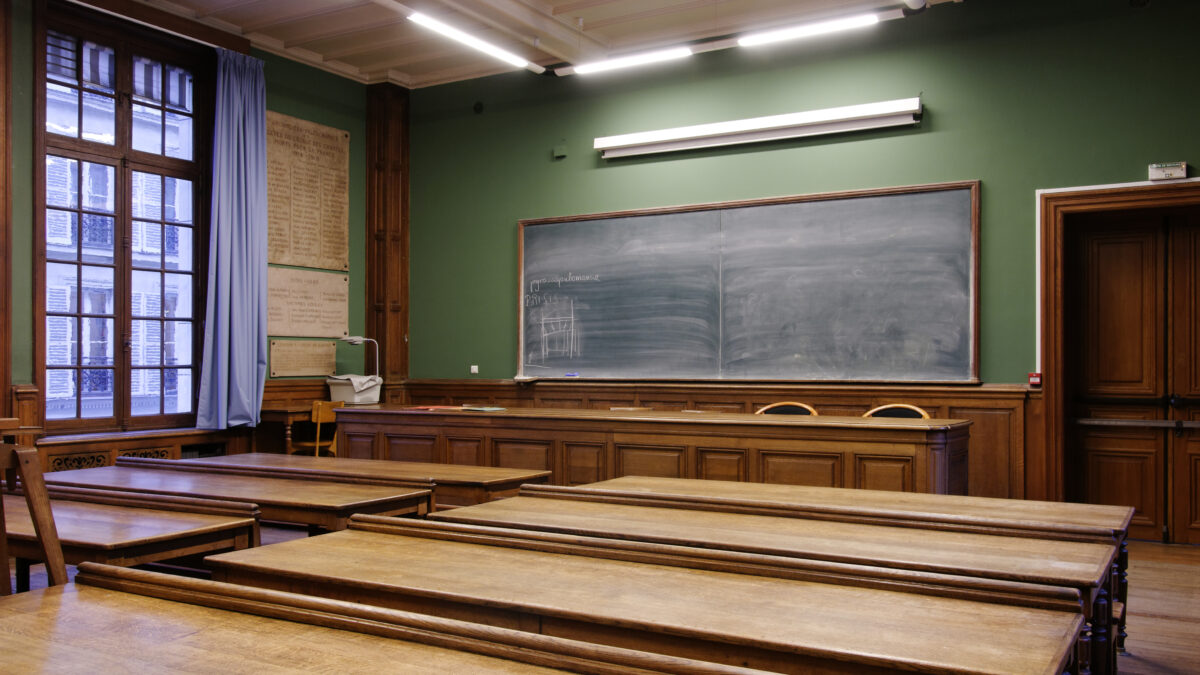
At the beginning of the school day, the halls are mostly empty. A few students straggle through the halls and wander into classes. The official start of the day is 8:15, but most students will not be in school at that time, and the students who are will wander into class sometime before 8:30. Who knows when announcements will happen.
First Period Advanced Placement
At the start of class, 50 percent of class is not present. Twenty-five percent are absent, 25 percent are late, and many of those are late by at least half the class period.
I pass out copies of “Narrative of the Life of Frederick Douglass” and give a brief background on Douglas. No one takes notes.
I next assign the introduction and preface for reading in class. Maybe six of 20 students open the book and start reading; other students open the book, but put it face down on the desk and get out their cell phones, although they are repeatedly told to put them away; a fair number do not open the book at all. One student asks if he can listen to music while he is reading, because, he says, “My brain doesn’t work in silence.” I tell him he needs to practice silence.
One student refuses to take the book. When I ask him why, he says he isn’t going to read it because he read it in fifth grade. Yeah, right! The teacher may have assigned it, but that doesn’t mean he read it. Besides, there are different levels of teaching the same book to various ages of students. Even if he had read it in fifth grade, it was most likely for comprehension only. I am using the book to teach rhetoric. He mouths off about it, and declares we should be reading Tupac Shakur instead.
I try to explain to him the difference between what we may like and what is considered quality work. He is unwilling to listen. He keeps arguing. I give up and say nothing more, but he will not stop arguing and continues to interrupt the few other students who are actually reading. Finally, after ten minutes of him mouthing off and my repeated requests for him to stop talking, I ask for his mother’s number. Few of the numbers in our school’s system are accurate; people change phones and addresses constantly.
He tells me I can call his father right now, pulls out the phone and dials the number. I try to talk to the father, but the poor connection makes it difficult. The father tells me his son doesn’t want to read the book. I explain the student always has a choice, but if he doesn’t read the book he will fail. That is the basic conversation. Nothing comes from the father other than that his son doesn’t want to read the book.
Class Change
Students walk through the halls, vulgar cuss words ringing through the air. They wrestle and horse play; they ignore teachers encouraging them to get to class and telling them to put their phones away. Class transition time is three minutes in this small building, but usually takes more like seven or eight to get the halls mostly clear.
Second Period Verbal SAT Prep
I go from the hall to my classroom; half of the students are not there. Some will come late; some will be absent; none are actually in their seats. I work on getting them to their seats.
They have a vocabulary test today. To help them review quickly and maybe earn a few extra-credit points, I have prepared envelopes containing the words and the definitions on separate strips. I explain that they can challenge themselves, working with partners to match the words and definitions, thus earning half an extra-credit point for each pair, with the potential of earning 15 extra points on a 35-point test.
The hall monitor (not a student, but a grown man paid to do this job) brings a student to my class late. I explain to the monitor that this student is 10 or 15 minutes late to class every day. The student starts complaining about me always getting on his case. Then I remind him that his backpack needs to be put into his locker. This is school policy. The student starts screaming about me always picking on him and giving him a hard time.
He walks away, down the hall, disappearing down the stairs. The hall monitor does nothing, except to high-five another student who walks out of the class without permission to greet the monitor in the hallway. The hall monitors are more “buddies” than adults to the students. I don’t see the late student that period. Who knows where he has gone.
I go back into the classroom to see how students are doing on the vocabulary matching challenge. Many don’t bother trying. A few get to work and seem to enjoy the challenge.
Several students who have been skipping class regularly complain they didn’t know there was a test today or that they don’t know the words, so I should not require them to take the test. Yes, really. The complainers are often students with third- or fourth-grade reading levels who certainly don’t belong in an SAT prep class, but such are the realities of my school. Even with reduced workloads and adjusted assignments, they rarely try. They really need remedial classes, but current policy says this would deny them their “right” to be in a regular classroom, which seems to be more important than them actually learning to read.
Vulgar words proliferate throughout the students’ conversations, said at full volume with no apparent awareness that this may not be okay in a school room or a school building. A few partnered teams earn extra credit points. I ask students to clear their desks and put their phones away (for about the sixth time that class). I tell them that if they talk or look on another student’s test or take out phones, they will fail.
Students start talking during the test. I give them repeated warnings. I move talkers apart. One person says, “I am just reading out loud.” I tell him patiently that this is not acceptable during a test. He replies, “How you gonna tell me if I should read out loud or not? Who are you to say?” He gives me the “stink face,” vernacular for an utterly contemptuous sneer, one every teacher in my building (and probably in many similar schools across this country) has experienced. I tell him that if he must read aloud, he can move to the back of the room and work there where he will not disturb others. He sneers again and says, “I ain’t moving there,” finally getting back to his test, finally silent.

Another student sits doing nothing. I ask why. He says he doesn’t have a pen. I point to the bin of clip boards, like those found in doctor’s offices with pens attached. He looks at them, gives me the stink face and says, “I ain’t using them.” He would rather take a zero than “degrade” himself by using a pen provided for him when he does not bring his own. He is wearing $200 tennis shoes.
Two times, I take tests away from students who take out their phones again during the test. One young lady protests and says her mother is texting her and expects a response. If I talk to the mother and ask her not to text her child during the day, I am likely to get the response, “I paid for the phone, I will text her when I want.” I take her test and say her mother is welcome to contact the office with a complaint.
Do not be misled, by the particular students I am describing, into thinking they are all like this. Quite a few students in the room are doing the right thing, trying on their test, minding their manners. I think, “Don’t these kids deserve a good education?” But it is so hard to get to them through the chaos one must fight daily.
Also, do not believe the administration in my building is not trying to address these problems, but their hands are often tied: they are constantly jumping through hoops with new directives, new paperwork, and new paradigms that attack anything they try to do.
These paradigms are often dictated by academics who have never set foot in a classroom like mine, or by people like Andres Alonzo, Baltimore’s ambitious former CEO who was thinking about his next cushy position at Harvard all while he was breaking even further an already broken system. The principal cannot suspend a kid unless blood is drawn. The leadership at the top of the system is just interested in playing political games. Teachers and students are expendable pawns.
My school is 99 percent black, so this is not a caricature of how black kids are the problem at my school while the white kids are good. Some students behave badly, but many are worth fighting for.
Back to my day.
Class Change
Students fill the air with vulgarity again. One student, mad at another, grabs the hall monitor’s chair and sends it sliding full-force down the hall at the other student. He barely misses me, but only because I hear it coming and jump back. Since I was looking in the other direction, I am not sure who threw it, but admin can look at the video. They may or may not get to it. (Two weeks later, I still haven’t heard a word.)
I notice a teen walk by whom I had reported to the office yesterday for sneaking into my room during one class period then cussing me out when I made him leave, calling me an “M-Effer” repeatedly and saying he would do whatever the “Eff” he wanted. The assistant principal wanted to suspend him for that and many other offenses over the past few days, but I guess no blood was drawn. Don’t the children who are in my room deserve to be protected from disgusting behavior like that, too?
Lunch
Three students who cannot stand the chaos and cacophony of the cafeteria eat their lunch in my room, where it is quiet. Just after they sit down, two boys whom I do not know come into my classroom. They start poking and teasing the quiet young man sitting there. I tell them to get out of my room. They act as if I am not even there. I say louder, “GET out of my ROOM.” They still completely ignore me. Finally, I stand up and scream, “GET OUT OF MY ROOM, NOW!” They only leave as I start walking quickly toward them.
Next Period: More of the Same
Class change: Someone around the corner of the hall is screaming as though she is being murdered—and I mean that quite literally. The teachers standing at the corner do not react, so I assume she is not being murdered. She continues screaming until her screams fade down the stairwell.
Finally, during planning period there is quiet, if I can ignore the asylum-like sounds emanating from the halls and neighboring classrooms. In walks one of my students, who had graduated then went onto college. She gives me a big hug and says how she misses me and thanks me for the help I have given her. I ask her about her school experiences, praise her grades, and tell her how proud I am of her. She leaves to say hello to other teachers.
I sit in blessed silence for a few minutes before some student walks by and slams my partially open door shut. Students perform this act of aggression fairly regularly throughout the building. I then hear a girl chastising the aggressor quite loudly. She says, “Leave her door alone; she tired of that shit.” I smile at her support of me and shake my head at her word choice and poor grammar.
Sixth Period
I am standing in the front of class giving directions about the vocabulary-matching challenge, when a student from another period walks in rapidly, stopping right in front of me. He physically blocks me from the view of the class and stands only about three feet away. He has just gotten his progress report from the office, and thrusts the paper at me. He has come to confront me about his failing grade, even though he knows perfectly well why he got an F.
I tell him that he has interrupted my instruction, that this is not the time or the proper manner to approach me, and that he can talk to me about it after school. He leaves, but it takes me another five minutes to get the class settled down again to hear my directions.
Last Period
It is ten minutes before the end of class. One student gets up and starts to leave when a friend of hers comes to the class door and calls her. She packs up and walks out. I stop her. “Wait a minute. Where are you going?” She looks at me as though I were stupid and rude. “I got stuff to do!” she exclaims.
She doesn’t seem to accept the fact that school does not end for ten more minutes, nor does she understand that her reaction would be utterly shocking to teachers in most schools across this country. I question her: “So if you have things to do, you just walk out of class whenever you want?” She responds, “Yeah!” in a “Duh!” manner. I explain to her that this is not how it works. She wants to argue.
Finally, I say, “If you need to go somewhere, you are supposed to ask if you can have a pass, and I will most likely give you one if your request is reasonable.” I tell her to go back in the room until school ends. I have to stand in front of the door to keep other students from leaving early. I do this every day. One girl tries to push past me, but I stand my ground.
School’s Out
It’s 3:05 p.m. Finally, I open the door and screaming students fill the hallway, gradually making their way down the steps and out of the building. I start gathering up my stuff, packing grading that I should do tonight, but knowing that when I get home and hit the couch, I will sink into such exhaustion that getting into bed after a few hours of TV will be all I can manage.
But while I am packing my things, one of my students walks in and starts picking up paper balls from the floor and putting forgotten chairs up. He says, “Ms. Casey, these children just trash your room.” I reply, “That is nice of you to pick that up.”
This student has been a problem student for me in the past. I also had him last year. He showed up only a few times a month, and disrupted class every time. For him, class was a social event during which he talked, joked, and laughed throughout, whether I was trying to teach or had assigned work or was giving a test. He never acknowledged any warnings or requests for him to stop. As far as he was concerned, I was just another person in the room who occasionally irritated him like a fly buzzing in his ear.
But this year he has made a major change. He is in school at least two-thirds of the time; he does his work thoroughly when he is there; and, although he still talks too much, he does apologize when I ask him to stop.
I expect him to pick up a few things and be done, but he moves methodically through the room. I ask him what he is doing. He says, “Ms. Casey, I come in this room every afternoon, but you usually gone by then. I don’t like the way the kids treat your room. I want to help the custodians. They work so hard, I just want to help.” I am deeply moved and tell him how impressed I am with his kindness.
On my way out of school, a ninth-grade honor student with the face of an angel, a young man one of my students had introduced to me but whom I do not teach, sees me and breaks into a big smile. “Good night, Ms. Casey,” he says. I think again, “Doesn’t he deserve a real education?”
On my way out of the building, I see a group of fellow teachers chatting, and I join in. We have little time with each other and are mostly isolated in our classrooms. The group is talking about yet another teacher who has quit—walked out in the middle of the school day.
That is the sixth teacher this year to quit, from a staff of around 60 teachers. Half of all new teachers don’t make it past the first year; more leave before year five. This particular teacher already had 12 years of service in, but just couldn’t take it anymore.
Chaos can do that to a teacher. Every day this week, some teacher was crying. Even I cried one day, and I am not usually a crier. Exhausted, I climb into my car and wave at a few students as I pull out of the lot.
Tomorrow, I will do it all over again, as I have for the past 23 years. Maybe.









